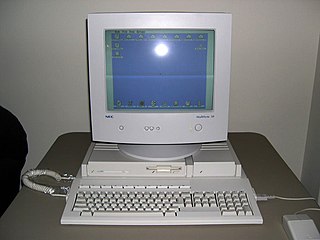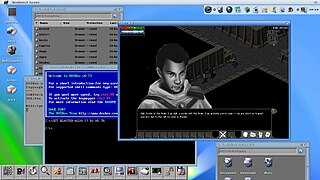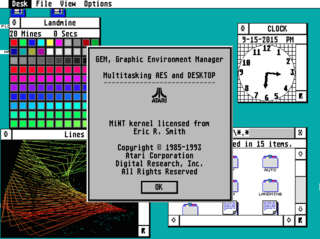
Amiga is a family of personal computers introduced by Commodore in 1985. The original model is one of a number of mid-1980s computers with 16- or 16/32-bit processors, 256 KB or more of RAM, mouse-based GUIs, and significantly improved graphics and audio compared to previous 8-bit systems. These systems include the Atari ST—released earlier the same year—as well as the Macintosh and Acorn Archimedes. Based on the Motorola 68000 microprocessor, the Amiga differs from its contemporaries through the inclusion of custom hardware to accelerate graphics and sound, including sprites and a blitter, and a pre-emptive multitasking operating system called AmigaOS.

Atari ST is a line of personal computers from Atari Corporation and the successor to the company's 8-bit home computers. The initial model, the Atari 520ST, had limited release in April–June 1985, and was widely available in July. It was the first personal computer with a bitmapped color graphical user interface, using a version of Digital Research's GEM interface / operating system from February 1985.
The Motorola 68000 series is a family of 32-bit complex instruction set computer (CISC) microprocessors. During the 1980s and early 1990s, they were popular in personal computers and workstations and were the primary competitors of Intel's x86 microprocessors. They were best known as the processors used in the early Apple Macintosh, the Sharp X68000, the Commodore Amiga, the Sinclair QL, the Atari ST and Falcon, the Atari Jaguar, the Sega Genesis and Sega CD, the Philips CD-i, the Capcom System I (Arcade), the AT&T UNIX PC, the Tandy Model 16/16B/6000, the Sun Microsystems Sun-1, Sun-2 and Sun-3, the NeXT Computer, NeXTcube, NeXTstation, and NeXTcube Turbo, early Silicon Graphics IRIS workstations, the Aesthedes, computers from MASSCOMP, the Texas Instruments TI-89/TI-92 calculators, the Palm Pilot, the Control Data Corporation CDCNET Device Interface, the VTech Precomputer Unlimited and the Space Shuttle. Although no modern desktop computers are based on processors in the 680x0 series, derivative processors are still widely used in embedded systems.

The Amiga 600, also known as the A600, is a home computer introduced in March 1992. It is the final Amiga model based on the Motorola 68000 and the 1990 Amiga Enhanced Chip Set. A redesign of the Amiga 500 Plus, it adds the option of an internal hard disk drive and a PCMCIA port. Lacking a numeric keypad, the A600 is only slightly larger than an IBM PC keyboard, weighing approximately 6 pounds (2.72kg). It shipped with AmigaOS 2.0, which was considered more user-friendly than earlier versions of the operating system.

UAE is a computer emulator which emulates the hardware of Commodore International's Amiga range of computers. Released under the GNU General Public License, UAE is free software.

The Atari Falcon030, released in 1992, is the final personal computer from Atari Corporation. A high-end model of the Atari ST line, the machine is based on a Motorola 68030 CPU and a Motorola 56001 digital signal processor, which distinguishes it from most other microcomputers of the era. It includes a new VIDEL programmable graphics system which greatly improves graphics capabilities.

Basilisk II is an emulator which emulates Apple Macintosh computers based on the Motorola 68000 series. The software is cross-platform and can be used on a variety of operating systems.

The Atari TT030 is a member of the Atari ST family, released in 1990. It was originally intended to be a high-end Unix workstation, but Atari took two years to release a port of Unix SVR4 for the TT, which prevented the TT from ever being seriously considered in its intended market.

The Motorola 68881 and Motorola 68882 are floating-point units (FPUs) used in some computer systems in conjunction with Motorola's 32-bit 68020 or 68030 microprocessors. These coprocessors are external chips, designed before floating point math became standard on CPUs. The Motorola 68881 was introduced in 1984. The 68882 is a higher performance version produced later.
The Atari Coldfire Project (ACP) is a volunteer project that has created a modern Atari ST computer clone called the FireBee.

The Atari Mega STE is Atari Corporation's final Motorola 68000-based personal computer in the Atari ST series and the second to last model overall. Released in 1991, the Mega STE is a late-model STE mounted in the case of an Atari TT computer. It was followed by the higher end Atari Falcon in 1992.
The Amiga is a family of home computers that were designed and sold by the Amiga Corporation from 1985 to 1994.
The Amiga computer can be used to emulate several other computer platforms, including legacy platforms such as the Commodore 64, and its contemporary rivals such as the IBM PC and the Macintosh.
Amiga software is computer software engineered to run on the Amiga personal computer. Amiga software covers many applications, including productivity, digital art, games, commercial, freeware and hobbyist products. The market was active in the late 1980s and early 1990s but then dwindled. Most Amiga products were originally created directly for the Amiga computer, and were not ported from other platforms.

Minimig is an open source re-implementation of an Amiga 500 using a field-programmable gate array (FPGA).

AmiKit is a compilation of 425 pre-installed and pre-configured Amiga program running on Windows, macOS, Linux computer, and on Amiga computer with Vampire V2 card.

AROS Research Operating System is a free and open-source multi media centric implementation of the AmigaOS 3.1 application programming interface (API) which is designed to be portable and flexible. As of 2021, ports are available for personal computers (PCs) based on x86 and PowerPC, in native and hosted flavors, with other architectures in development. In a show of full circle development, AROS has been ported to the Motorola 68000 series (m68k) based Amiga 1200, and there is also an ARM port for the Raspberry Pi series.
Hombre is a RISC chipset for the Amiga, designed by Commodore, which was intended as the basis of a range of Amiga personal computers and multimedia products, including a successor to the Amiga 1200, a next generation game machine called CD64 and a 3D accelerator PCI card. Hombre was canceled along with the bankruptcy of Commodore International.

TOS is the operating system of the Atari ST range of computers. This range includes the 520ST and 1040ST, their STF/M/FM and STE variants and the Mega ST/STE. Later, 32-bit machines were developed using a new version of TOS, called MultiTOS, which allowed multitasking. More recently, users have further developed TOS into FreeMiNT.
MagiC is a third party and now open-sourced multitasking-capable TOS-compatible operating system for Atari computers, including some newer clone systems manufactured later. There are also variants that run as part of Mac and PC emulation environments, as well as on macOS Intel-Mac computers.













